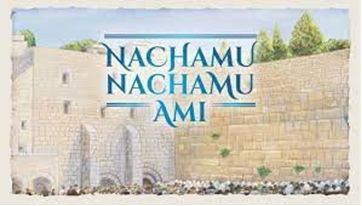The
Haftorah.
We know it’s part of the Shabbat morning service. It’s the selection from the Prophets that complements the Parsha. Originating as an effort to maintain a weekly Jewish message when Torah reading was outlawed or to combat those who denigrated the Prophets, it has become an honor as well as a Bar Mitzvah rite of passage. For some, the Haftorah is an opportunity to take a break from the service and even spawned something called a “Kiddush Club.” (Maybe it gives people extra energy to absorb the rabbi’s sermon…)
During the weeks between Tisha B’Av and Rosh Hashanah, there are seven special “Haftorahs of Consolation” that show that the relationship between God and Israel will be restored, also setting the spiritual stage for the High Holiday season creating a closer, stronger relationship between God and the Jewish people. These Haftorahs are an established tradition and are not skipped for any reason - except when Rosh Chodesh Elul falls on Shabbat as it does this year. This Shabbat, we will read the Haftorah for Shabbat Rosh Chodesh (Isaiah 66:1-24).
Having the good fortune to be spending a few days in Israel with Naama to celebrate a Bar Mitzvah and see our daughter, Meira, I feel that this Haftorah is being fulfilled before our very eyes. All too often, the world experiences Israel through headlines of struggle and strife - whether between Israel and her neighbors or within Israel. We must not forget to take a long, loving look at the beauty and majesty of the State of Israel.
Listen to the words of the prophet:
“Who heard anything like this? Who saw anything like these? Is a land born in one day? Is a nation born at once, that Zion both experienced birth pangs and bore her children?” (66:8)
Think of how Israel has grown and keeps expanding. From north to south and from Jerusalem to Tel Aviv, the (construction) crane is the official bird of Israel. Next time you visit the Kotel, notice the new Western Wall Heritage Foundation Center and the incredible excavations as the construction for the future also uncovers the past. Israel has accomplished so much in 75 years! Who has heard or seen anything like this?!?
“Rejoice with Jerusalem and exult in her all those who love her: rejoice with her a rejoicing, all who mourn over her.” (66:10)
Israel
is filled with children! These are the last days of summer vacation when the
streets are packed with families until late at night. One popular night
activity was at Teddy Park in Jerusalem in which children - Arab and Israeli,
secular and Chareidi - run exuberantly around the fountain which shoots water
high into the air. (Think of an Israeli version of the Bellagio in Las Vegas.)
The streets of Jerusalem are filled with shrieks of joy and laughter. We have
mourned in the past, but, today, there is joy.
“And it shall be from new moon to new moon and from Sabbath to Sabbath, that all flesh shall come to prostrate themselves before Me," says the Lord.” (6:23)
Isaiah
speaks of a time in the future when all the nations will converge on Jerusalem
in honor of Rosh Chodesh. Walking the streets of Jerusalem today, one
encounters Jews and Arabs as well as Jewish and non-Jewish tourists. I felt
this on a crowded Jerusalem light-rail train, crammed between Chasidim, secular
Israelis and Arabs. There wasn’t any prostrating, but Jerusalem is a city in
which all converge.
I’ll be listening to this Haftorah in America, but I will be able to appreciate its message far better having seen the prophecy coming true on our times. Maybe the Haftorah has a lot more to tell us than we think…






